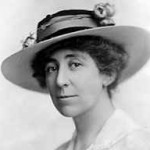 If women had held the preponderance of political leadership roles for the last few millennia, would peace have become more of a central organizing theme of history than war?
If women had held the preponderance of political leadership roles for the last few millennia, would peace have become more of a central organizing theme of history than war?
Jeannette Rankin, a Montana Republican and lifelong pacifist, was elected to Congress in 1916; that’s four years before the Constitution gave all women the right to vote. Not only did Rankin lead the way as a first for women, she defied all semblance of political tradition by opposing both World War I and World War II.
Rankin’s leadership style has many lessons for us today, especially since she did not shy away from controversy. The subject of Rankin’s very first Congressional vote (against President Wilson’s WWI war resolution) set the stage for her destiny. Rankin lost the support of most of the women’s suffragists who had campaigned for her, because they feared her anti-war vote made women look weak and hurt the suffrage movement. Embracing controversy can be tough when we ruffle the feathers of our opponents, but it’s even tougher when we lose the support of our closest friends and allies.
Filmmaker Kamala Lopez explores Jeannette Rankin’s life in the film “A Single Woman.” The film’s website sums up Rankin’s life in brief:
In 1920, Rankin became founding vice-president of the American Civil Liberties Union who, in 1933, tried to persuade President Roosevelt to revise immigration laws and allow Jewish refugees into the United States.
Twenty-two years later, in 1940, Jeannette was re-elected as Congresswoman from Montana on a peace platform and once again voted against a world war, this time as the lone anti-war voice in the American Legislature. She was mobbed and vilified and spent the rest of her life traveling to India and studying the teachings and methods of Gandhi and the effects of colonialism on peoples all over the world.
During the Vietnam era, she enjoyed a renaissance when the anti-war culture of the day celebrated her perseverance as a dedicated pacifist and human rights advocate.
Be sure to watch the trailer here for a small whiff of what truly solitary, ahead of the curve, leadership feels and looks like. And listen to an oral history interview with Rankin, who lived long enough to oppose the Vietnam War before she died in 1973 at age 93.
Jeannette Rankin’s story is an important study in the complexities of leadership in women’s history. To be sure, many female leaders – Golda Meir, Margaret Thatcher for example – were far from pacifists. Still, most of the peace movements have been started and led by women from the fictional Lysistrata through Code Pink today. Thoughts as to why that has been the case? Please share them in the comments section.
For more thoughts on how women can reach parity in elected office, check out this interview.
Gloria Feldt
Latest posts by Gloria Feldt (Posts)
- This Blog is No Longer Active… - March 17, 2014
- Women’s Equality Day and the Civil Rights March - August 26, 2013
- Stuck? Change Your Relationship With Power - July 21, 2013





 "Female Writers Kicking Up Literary Dust"
"Female Writers Kicking Up Literary Dust"
One Response to Remembering Jeannette Rankin, First US Congresswoman